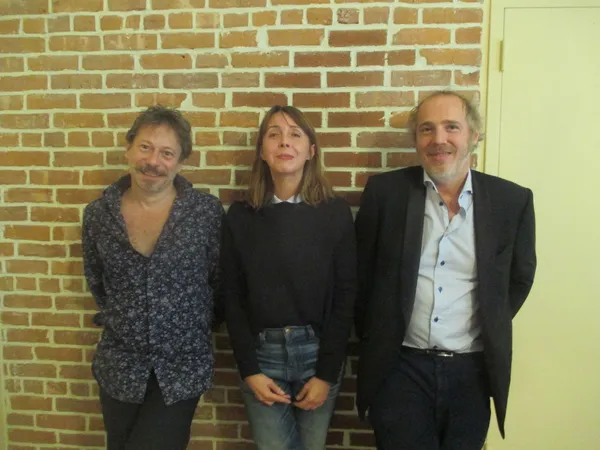 |
| The lineup for Ismael’s Ghosts: Director’s Cut - Mathieu Amalric with Anne-Katrin Titze and director Arnaud Desplechin Photo: Lilia Blouin |
Arnaud Desplechin's Ismael's Ghosts: Director's Cut (Les Fantômes D'Ismaël), screenplay by the director with Léa Mysius and Julie Peyr, cinematography by Irina Lubtchansky (My Golden Days, La forêt), stars Mathieu Amalric, Marion Cotillard and Charlotte Gainsbourg with Louis Garrel, László Szabó, Alba Rohrwacher, and Hippolyte Girardot.
On the afternoon before the New York Film Festival premiere, Arnaud Desplechin and Mathieu Amalric discussed with me what to do with a phantom, Woody Allen's Bananas and the theme from Marnie, a touch of Claude Lanzmann (Fours Sister - Special Event), de-whispering with Rilke, suffering with Philip Roth, Jackson Pollock and the "real pleasure to do too much", Jacques Lacan's Seminar VIII in Tel Aviv, loving someone like an apple, what makes a good dreamer, second chances, and never abandoning Vertigo.
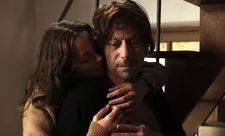 |
| Marion Cotillard is Carlotta and Mathieu Amalric is Ismael |
The director's cut of Ismael's Ghosts is structured around a mirroring of visitations. Ismael (Mathieu Amalric in a cannonball of a performance) is a film director. His wife Carlotta (Marion Cotillard) disappeared 20 years ago and has never been heard from again. Her father Henri Bloom (László Szabó), also a film director, who eagerly awaits the retrospective of his documentaries in Tel Aviv, has been mourning his daughter with equal fervour.
One day, in the dunes by the ocean, Ismael's current girlfriend, astrophysicist Sylvia (Charlotte Gainsbourg) is visited by Carlotta. Grégoire Hetzel's music swells and flows and becomes another spectacular layer. Ivan Dedalus (Louis Garrel) is Ismael's brother, working for the Office of Foreign Affairs - "disappearing was his specialty."
Anne-Katrin Titze: The film could have been called Variations On Disappearance.
Arnaud Desplechin: Yes. I still think that Ismael's Ghosts is the better title.
AKT: It's true. It is. But it is all about disappearances, different kinds of disappearances.
AD: It's about disappearances and the experience of loss, too. The main experience of loss being through Carlotta. For the two characters, for Ismael and Bloom. I love the scene with you [to Mathieu] and László [Szabó] at the beginning when you are looking at the photos on the screen.
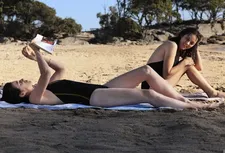 |
| Sylvia (Charlotte Gainsbourg) with Carlotta (Marion Cotillard) |
Mathieu Amalric: Oh, yeah.
AD: And, you know, you have this conflict between the two men because the two of them experience the loss of this woman but in two different ways. Because one was the father and the other one the husband. So you have the anger, the bitterness, the love. It's about disappearance, yeah.
AKT: The idea that the father calls the husband in the middle of the night to watch this, that's really pushing it. It goes quite far. Besides disappearance, of course, reemergence is a thing here. In dreams, the dead return casually. I think for most people. Were you taking what happens in dreams as an every day casual occurrence and then using this as a starting point?
AD: I don't know if I used it as a starting point but I love your question for two reasons. One being that in fact on several aspects Ismael's Ghosts is a dream. It's very dreamlike in its storytelling. You are jumping from one level of storytelling to another one and it's full of fictions and it's jumping from all these levels. It's a dream logic, other than a realistic logic in the storytelling.
I can think about a scene, you know, when Ismael escapes to go to Roubaix. And when he is in the train conducting him to Roubaix and you have all these images of Roubaix and you have the voice-over of Mathieu and it's a dream. And you don't know any longer if you are in reality or in a dream.
_f8gDbpV_225.webp) |
| Arnaud Desplechin: "The main experience of loss being through Carlotta." |
What I love in your question, too, is the fact that for me it's a very strong experience, you know, the fact of dreaming about dead people. I'm quite good with dreams, my whole life. What I mean is that I'm able to plan my dreams.
AKT: Okay.
AD: They may lead you in the work, you know, during the shooting session, during two months, I just dream about the following day. Period. No imagination and I will dream about the problem that I will meet. You know, the stupid problems, where to put the cars in order to direct the actors, where to put the camera - that's my dreams. I'm able to think, Arnaud, you will dream about this or that. There's one thing that I'm not able to do with my brain - to say, I would love to dream about this person that I miss. And I can't force my mind to do it.
AKT: Yes.
AD: So when it happens to you it's a blessing, an absolute blessing. And then you spend one week … No? It happened to you [to Mathieu], I'm sure? It happened to everyone. You spend one week on a cloud, thinking, oh, I'm blessed, I'm blessed.
AKT: Because they returned!
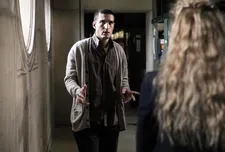 |
| Ivan Dedalus (Louis Garrel) confronts Arielle / Faunia (Alba Rohrwacher) |
AD: Yeah. She visited me. And that's the power of cinema. That's the definition. One of the powers of cinema.
AKT: Mathieu, can you do that too? Program your dreams for the next day?
Mathieu Amalric: No. It's a lot of work. It's really almost like a yoga work to prepare.
AKT: It's a training? With a name? Or is it just what you do?
AD: No, no, it's just something that I invented. You know, my way of dreaming and thinking. You know, this power that you have. The first experience that you have, which is easiest when you are making a good dream and you are awakening during the night or too early in the morning, you say, I would love to know the ending of it. If you're good at it, you are going to program, you fall asleep again and you have the ending of the story.
AKT: I actually did it last night, preparing for today. I didn't particularly like my question. It was about the nightmare of returning to a place of childhood.
AD: Yeah.
![Mathieu Amalric: "In all those moments with Hippolyte Girardot [Zwy], there was a real pleasure to do too much."](/images/newsite/Hippolyte Girardot_225.webp) |
| Mathieu Amalric: "In all those moments with Hippolyte Girardot [Zwy], there was a real pleasure to do too much." |
AKT: And then that's what I did last night, because of you. I knew I was going to talk to you about this topic, there I was in a place from my childhood that was being torn to pieces. Anyway, it does work. I know exactly what you mean by that dream preparation. The layers of your performance, Mathieu, are more extreme in this film, I think, than in any other previous alter ego films that you were making together.
MA: Good, good.
AKT: Do you feel that you are doubling up almost in speed, in intensity, in whatever?
MA: I wanted to go quicker. I want to be able to offer to Arnaud, like an athlete, more speed. And I'm not still there. We have to continue to work.
AKT: Next time.
MA: It's training also about the memory and the [he makes gurgling sounds]. But maybe something in Roubaix, it's not a cauchemar [nightmare] of his childhood, Roubaix. In his film, Roubaix has something arcadian.
AD: It's enchanted to me.
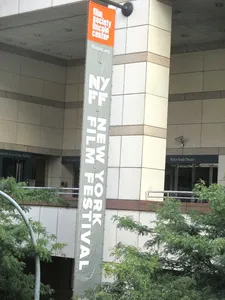 |
| New York Film Festival at the Film Society of Lincoln Center Photo: Anne-Katrin Titze |
MA: There is something that we did with Jackson Pollock. In all those moments with Hippolyte Girardot [Zwy], there was a real pleasure to do too much. And also too much with the set.
AKT: The paintings and the strings?
MA: Those strings of colours - everything is too much.
AKT: Scenes of surplus?
AD: It's Ismael. You are saying you compare him to the previous work that we did together. There is another character who is going too far and he was already called Ismael and it was in Kings And Queen. I don't know if it's too much, but I know that it's going too far. Each time that this character is moving, you think, "No, you are going too far. Be a little bit more careful!" But Ismael can't be careful. That's the definition of this character.
There is pushing the limits all the time, pushing the limits. It's a question to you, what you're seeing. Something that I love in Mathieu's performance is that he's going to the extremes when he is alone or when he's with Zwy. But sometimes, when he is with someone that he loves - let's say Charlotte Gainsbourg, or László Szabó, he's very gentle and subtle and sweet and full of modesty. It's funny to see this character who is able to be so wild suddenly being afraid of Charlotte Gainsbourg or being afraid of his father-in-law.
AKT: Absolutely. I didn't mean that you were going like a manic hamster in a wheel.
MA: No, I got that. It's also the invention and the spirit of Arnaud. That's why it's getting wilder and tender at the same time.
Arnaud Desplechin talks about never abandoning Vertigo, Jacques Lacan's Seminar VIII in Tel Aviv and loving someone like an apple.
Marion Cotillard talks about Ismael's Ghosts and her busy career.
The film is out in the UK on June 1





















